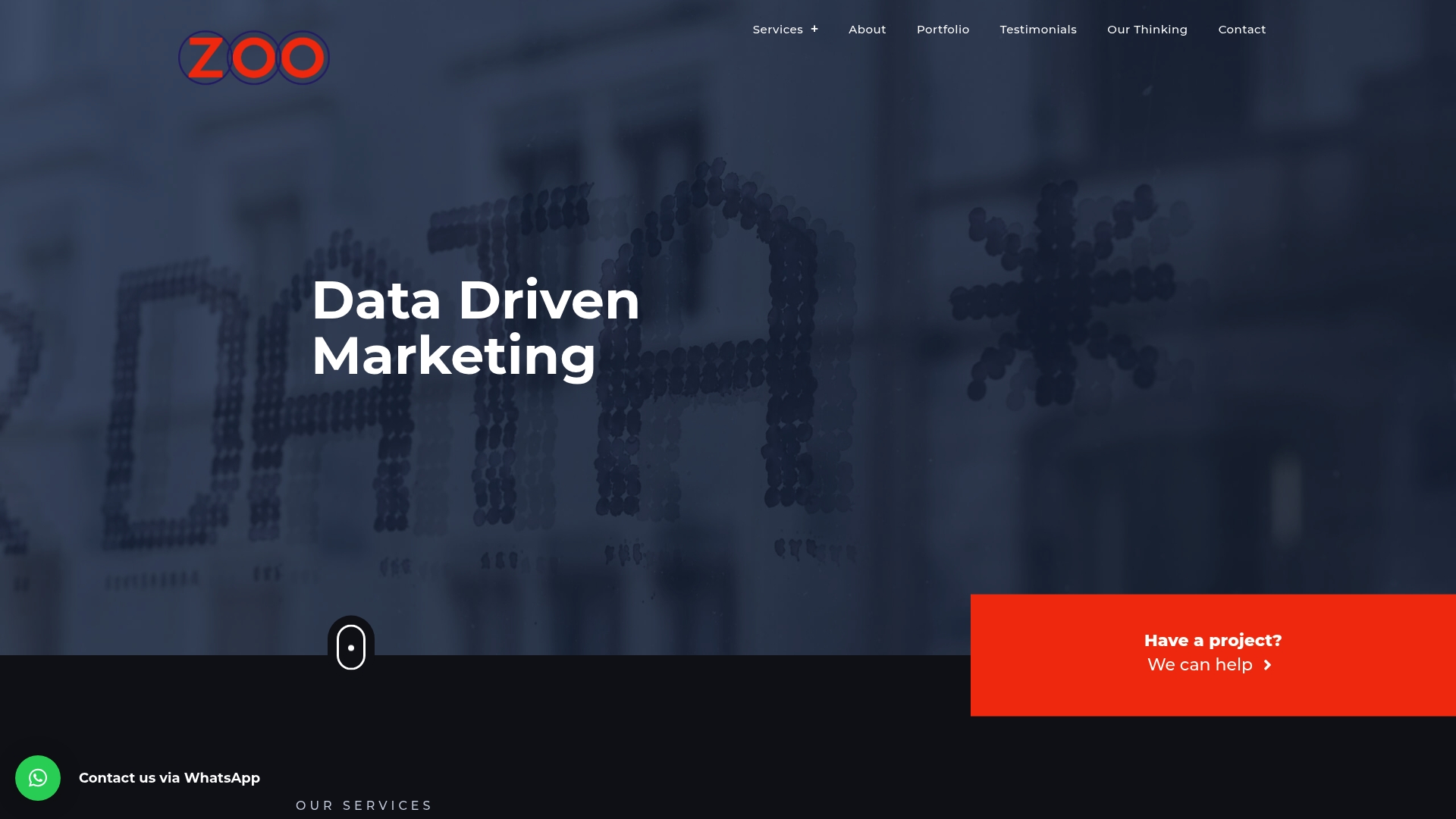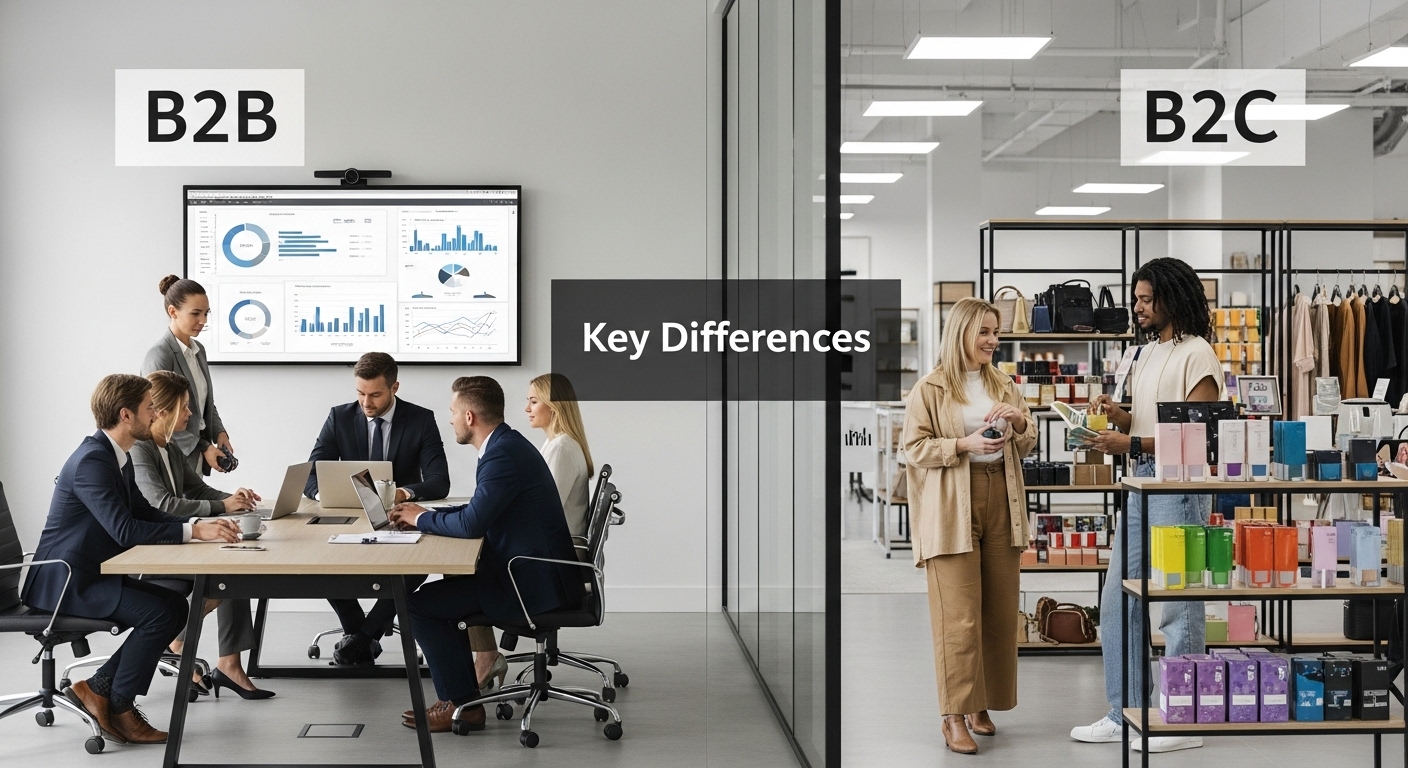B2B and B2C marketing shape nearly every business decision, touching everything from product launches to customer loyalty and even how companies talk to their audiences. Many assume the big difference is just who’s buying from you. But that’s a massive oversimplification. B2B markets actually make up almost half of the global economy, and the way decisions get made is nothing like you’d expect from everyday shopping.
Table of Contents
- Defining B2B And B2C Marketing: What They Are
- Why B2B And B2C Marketing Matter For Businesses
- The Key Differences Between B2B And B2C Marketing
- How B2B And B2C Strategies Affect Customer Engagement
- Real-World Examples Of B2B And B2C Marketing In Action
Quick Summary
| Takeaway | Explanation |
|---|---|
| Understand B2B and B2C differences | Recognizing the unique aspects of B2B and B2C marketing helps tailor strategies effectively. |
| B2B focuses on relationships | B2B marketing prioritizes building long-term, trust-based professional relationships to drive growth. |
| B2C targets emotional engagement | B2C marketing aims to create emotional connections and immediate value for individual consumers. |
| Tailor communication strategies | Different communication styles are essential for effective engagement in B2B and B2C contexts. |
| Maximize resource allocation | Specialized marketing strategies enable more efficient targeting and understanding of customer needs. |
Defining B2B and B2C Marketing: What They Are
B2B and B2C marketing represent two fundamental approaches to connecting businesses with their target audiences. While they share the ultimate goal of driving sales and creating value, their strategies, communication methods, and audience engagement differ significantly.
Understanding B2B Marketing
Business-to-business (B2B) marketing focuses on selling products or services directly to other businesses or organizations. Research from Sciendo highlights that B2B marketing involves complex decision-making processes where multiple stakeholders are typically involved in purchasing choices.
Key characteristics of B2B marketing include:
- Longer sales cycles with more complex negotiations
- Emphasis on logical, data-driven purchasing decisions
- Relationship-building as a critical component of marketing strategy
- Higher transaction values and longer-term business partnerships
B2B marketing strategies often involve professional networking, targeted industry events, detailed product specifications, and demonstrating clear return on investment for potential business clients.
Understanding B2C Marketing
Business-to-consumer (B2C) marketing targets individual consumers directly, focusing on creating emotional connections and meeting personal needs or desires. Unlike B2B marketing, B2C strategies prioritize quick, straightforward purchasing decisions driven by personal preferences and immediate value.
When developing B2C marketing approaches, businesses concentrate on:
- Creating emotional resonance with individual consumers
- Simplifying purchasing processes
These distinct marketing approaches require tailored strategies that recognise the unique characteristics of each target audience. Learn more about crafting effective marketing strategies to understand how businesses can successfully navigate these different marketing landscapes.
Why B2B and B2C Marketing Matter for Businesses
Marketing strategies are not just about selling products or services but about creating meaningful connections with target audiences. Understanding the critical importance of B2B and B2C marketing helps businesses develop targeted approaches that drive growth and sustainable success.
Strategic Business Growth and Market Penetration
Research from Business Markets indicates that B2B markets constitute nearly half of the global economy, highlighting their immense economic significance. These markets require sophisticated marketing strategies that go beyond traditional selling techniques.
Businesses benefit from specialized marketing approaches through:
- Precise targeting of specific market segments
- Enhanced understanding of customer needs and motivations
- Development of tailored communication strategies
- More efficient resource allocation
By recognising the unique characteristics of B2B and B2C markets, organisations can craft more effective marketing strategies that resonate with their intended audiences.
Building Long-Term Customer Relationships
Marketing in both B2B and B2C contexts is fundamentally about establishing trust and creating value. While the mechanisms differ, the ultimate goal remains consistent: developing sustainable relationships that drive business growth.
B2B marketing focuses on building professional partnerships through:
- Demonstrating technical expertise
- Providing comprehensive solution-oriented approaches
- Establishing credibility through detailed performance metrics
Learn more about digital marketing strategies for small businesses to understand how targeted marketing can transform business communication and customer engagement.
The Key Differences Between B2B and B2C Marketing
While B2B and B2C marketing share fundamental marketing principles, they diverge significantly in approach, communication strategies, and audience engagement. Understanding these nuanced differences helps businesses develop more targeted and effective marketing strategies.

Decision-Making Processes and Emotional Dynamics
Research from Sciendo highlights the critical distinctions in marketing communication processes between B2B and B2C markets. B2B marketing typically involves complex, rational decision-making with multiple stakeholders, while B2C marketing is driven more by emotional impulses and personal preferences.
Key decision-making characteristics include:
- B2B: Logical, data-driven choices involving multiple decision-makers
- B2C: Emotional, individual-driven purchasing based on personal desires
- B2B: Longer evaluation periods with detailed risk assessments
- B2C: Quicker, more impulsive purchasing decisions
These fundamental differences significantly impact how businesses approach their marketing communication and strategy development.
To clarify the distinct characteristics that set B2B and B2C marketing apart, the table below compares their approach to decision-making, communication, and relationship strategies.
| Aspect | B2B Marketing | B2C Marketing |
|---|---|---|
| Decision-Making Process | Involves multiple stakeholders, data-driven and rational | Driven by individual preferences, often emotional |
| Sales Cycle Length | Longer, with complex negotiations | Shorter, typically quick decisions |
| Relationship Focus | Builds long-term, trust-based business partnerships | Focuses on one-off or short-term consumer relationships |
| Communication Style | Formal, professional, and detailed | Conversational, engaging, and emotionally resonant |
| Content Approach | Technical expertise, comprehensive solutions | Storytelling, aspirational and personal relevance |
| Transaction Value | High-value, ongoing business deals | Usually lower-value, higher volume transactions |
| Personalisation Strategy | Customised, data-rich, deeply tailored to business needs | Broad appeal, lifestyle and desire-based messaging |
Communication and Relationship Strategies
Marketing communication in B2B and B2C contexts requires distinctly different approaches. B2B marketing emphasizes professional relationships, technical expertise, and long-term value propositions. Conversely, B2C marketing focuses on creating emotional connections, immediate gratification, and personal relevance.
Marketing communication differences include:
- B2B: Formal, detailed, and professional communication
- B2C: Conversational, engaging, and emotionally resonant messaging
- B2B: Content demonstrating technical competence and industry knowledge
- B2C: Content appealing to personal desires and lifestyle aspirations
Explore digital marketing terminology for small businesses to better understand the nuanced language and strategies used in different marketing contexts.
How B2B and B2C Strategies Affect Customer Engagement
Customer engagement strategies differ dramatically between B2B and B2C marketing, reflecting the unique characteristics and expectations of each target audience. Understanding these nuanced approaches helps businesses develop more effective communication and relationship-building techniques.
Relationship Depth and Interaction Complexity
Research from Business Literature reveals that B2B customer engagement involves multiple stakeholders and more intricate interaction patterns compared to B2C marketing.
Key engagement characteristics include:
- B2B: Complex, multi-layered relationship management
- B2C: Direct, individual-focused interaction models
- B2B: Prolonged decision-making and relationship-building processes
- B2C: Immediate, transaction-oriented engagement strategies
These differences fundamentally shape how businesses approach customer interactions and communication strategies.

Personalisation and Communication Strategies
Engagement strategies must be meticulously tailored to meet the specific expectations of B2B and B2C audiences. B2B marketing requires deep, professional personalisation, while B2C marketing focuses on emotional and lifestyle-driven connections.
Personalisation approaches differ through:
- B2B: Highly detailed, data-driven customised solutions
- B2C: Broad, emotionally resonant messaging
- B2B: Technical expertise and comprehensive problem-solving
- B2C: Lifestyle and personal desire-driven communication
Explore digital marketing terminology for small businesses to understand the sophisticated language of customer engagement across different marketing domains.
Real-World Examples of B2B and B2C Marketing in Action
Marketing strategies come to life through practical implementation, with distinct approaches in B2B and B2C contexts demonstrating the nuanced differences in audience engagement and communication techniques.
B2B Marketing Execution
Research from IMD highlights how successful B2B marketing focuses on building sophisticated, long-term professional relationships. Companies like Salesforce exemplify this approach by developing comprehensive marketing strategies that address complex business needs.
Characteristic B2B marketing strategies include:
- Creating detailed, solution-oriented content demonstrating technical expertise
- Developing targeted webinars and industry conference presentations
- Producing in-depth whitepapers and case studies
- Implementing account-based marketing techniques
These strategies prioritize demonstrating value, solving specific business challenges, and establishing credibility within professional networks.
To demonstrate practical B2B and B2C marketing strategies, the following table outlines some implementation methods used by leading companies in each domain.
| Marketing Type | Real-World Example Company | Key Execution Strategies |
|---|---|---|
| B2B | Salesforce | Solution-oriented content, webinars, case studies, account-based marketing |
| B2C | Nike | Emotional storytelling, social media engagement, personalised campaigns |
| B2B | HubSpot | Educational webinars, whitepapers, data-driven lead nurturing |
| B2C | Coca-Cola | Visually appealing content, lifestyle branding, broad engagement |
B2C Marketing Implementation
B2C marketing strategies prioritize emotional connection, immediate gratification, and personal relevance. Nike represents an exceptional example of B2C marketing by creating campaigns that transcend product features and connect directly with individual consumer aspirations and lifestyle choices.
Effective B2C marketing approaches involve:
- Developing emotionally compelling storytelling campaigns
- Leveraging social media for direct consumer engagement
- Creating personalized marketing experiences
- Designing visually appealing, shareable content
Learn how to use marketing analytics for small businesses to understand how data-driven insights can enhance marketing strategy across different business models.
Let Your Marketing Strategy Outperform the Competition
Struggling to adapt your marketing for the unique challenges of B2B and B2C environments? Many businesses know that understanding emotional versus data-driven decisions, long sales cycles and demanding stakeholders is one thing – but building effective campaigns tailored to each audience is another. The pressure to connect with the right customers and deliver measurable results can feel overwhelming.

Take the guesswork out of your marketing approach. Our team at Zoo Digital specialises in data-driven marketing strategies that bridge the exact gap highlighted in this article. From thorough tracking implementation and advanced Google Ads management, to streamlined HubSpot CRM setups and smart digital automations, we help you engage customers at every stage. Build trust, drive meaningful action and own your segment—visit Zoo Digital to start transforming your marketing and see measurable progress today.
Frequently Asked Questions
What is the main difference between B2B and B2C marketing?
B2B marketing focuses on selling products or services to other businesses, often involving complex decision-making and longer sales cycles. In contrast, B2C marketing targets individual consumers, emphasizing emotional connections and quick purchasing decisions.
How do decision-making processes differ in B2B and B2C marketing?
In B2B marketing, decisions are typically data-driven and involve multiple stakeholders, leading to longer evaluation periods. B2C marketing, however, is often based on emotional impulses and personal preferences, resulting in quicker and more impulsive purchasing decisions.
What strategies are most effective for B2B marketing?
Effective B2B marketing strategies include creating detailed, solution-oriented content, developing targeted webinars, and implementing account-based marketing techniques to build long-term professional relationships and demonstrate value.
How can businesses improve customer engagement in B2B and B2C marketing?
For B2B marketing, businesses can improve engagement by focusing on professional personalisation and providing comprehensive problem-solving solutions. In B2C marketing, companies should create emotionally resonant content and personalized marketing experiences to connect with individual consumers.

